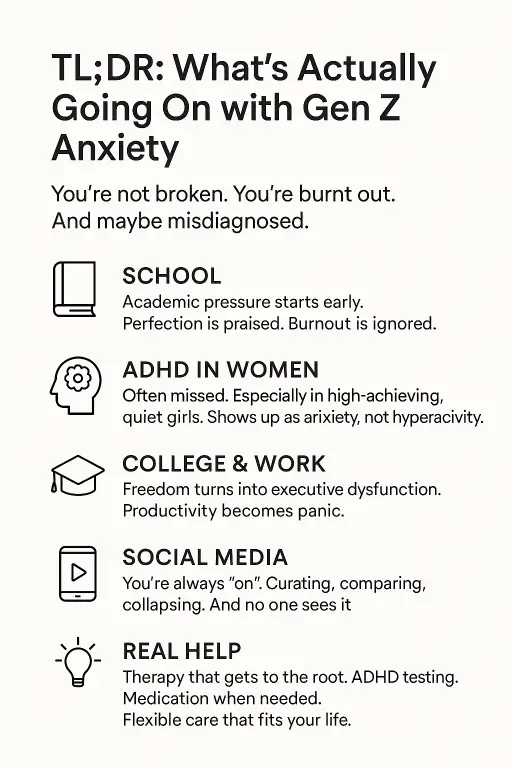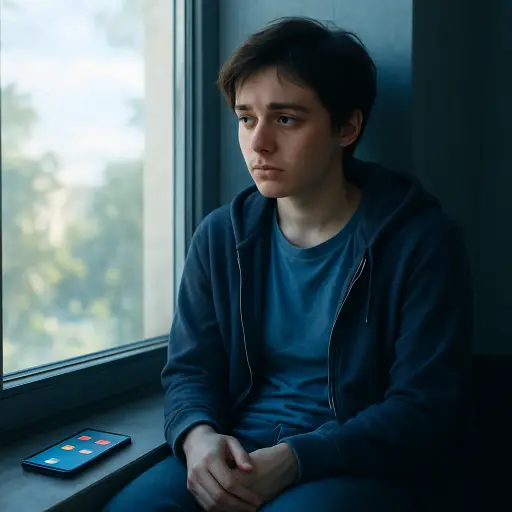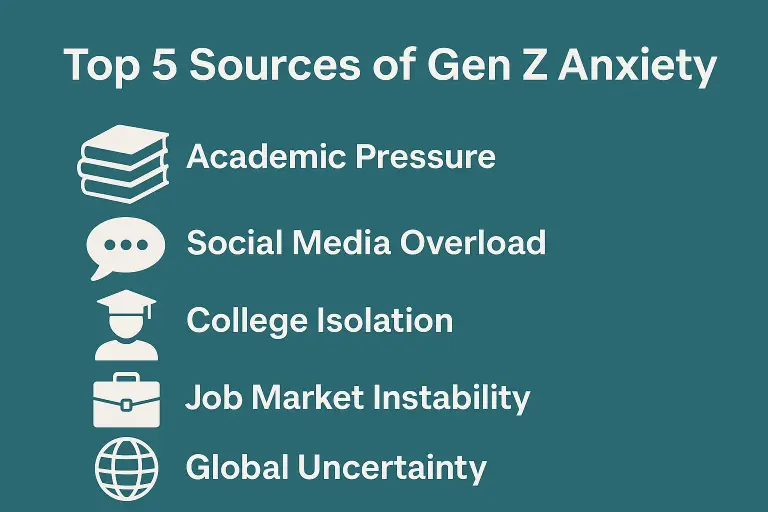Why Is Gen Z So Anxious?
Why You Feel Fried, Frozen, and Ready to Disappear by Tuesday
If you’re tired of being told to “just breathe” while juggling 14 tabs, a college paper, and a crisis in the group chat — read this.
You’re not weak. You’re not dramatic.
And if you’re a parent, your kid isn’t just “going through a phase.”
Gen Z is anxious for real, measurable, relentless reasons, and until we start naming them out loud, therapy and wellness tips won’t do much.
As a psychiatrist who treats young adults every day, especially those who are high-functioning, ADHD-diagnosed (or not-yet-diagnosed), and totally overwhelmed . Let me walk you through what’s actually going on.
It’s not just you. It’s the environment, the expectations, and the exhaustion — all happening at once.
School Is Where Anxiety Started (And Never Stopped)
Let’s rewind.
A lot of Gen Z’s anxiety didn’t begin in college. It started with the pressure to succeed early.
- Honor classes before puberty.
- Tracking every grade.
- Constant feedback loops.
- Perfection masked as motivation.
If you had ADHD — especially as a girl , your symptoms were probably missed because you were the “quiet, capable one.”
But inside? You were masking, overworking, and burning out before senior year.
By the time you hit college, you weren’t thriving. You were crashing with depression, executive dysfunction, or a sudden loss of drive.

College Didn’t Bring Freedom. It Brought Free-Fall.
College is supposed to be a fresh start, right?For many of our patients, it’s when anxiety and depression peak.
- No structure = executive chaos
- Social isolation = emotional flatline
- Unmedicated or misdiagnosed ADHD = serious academic struggle
If you’re a student reading this and thinking,
“I can’t concentrate, I’m constantly behind, I hate group work, and I dread emails,”
— you’re not alone. That’s not laziness. It might be untreated ADHD plus academic trauma.
Then Came the Job Market, And Panic Set In
You did everything right. The grades. The resume. The unpaid internships. Now what?
- Entry-level jobs barely cover rent
- You’re expected to be emotionally available and hyper-productive
- You crave purpose, but the system rewards burnout
And let’s be real: group Slack messages feel like landmines
If you’re feeling anxious about the future — it’s not in your head.
It’s baked into the economy and the culture. But that doesn’t mean you’re stuck.
Social Media Isn’t Just a Distraction. It’s a Drain.
It’s where you connect.
It’s also where you get judged, perform, compare, and spiral.
Social media doesn’t just amplify anxiety, it reprograms your nervous system to stay in a low-grade state of alarm.
- You’re “always on”
- You’re never enough
- You can’t turn it off because it’s also how you learn, laugh, organize, and feel seen
This is especially brutal if you already have rejection sensitivity, emotional dysregulation, or impulsivity — all hallmarks of ADHD.

ADHD, Anxiety, and the Diagnoses That Slip Through the Cracks
Here’s where it gets real.
ADHD in women, especially Gen Z women, is chronically underdiagnosed.
Why? Because:
- You weren’t disruptive in school — just tired and perfectionistic
- You “managed” through planners, and internalized everything (cue anxiety + self-blame)
- You excelled — until you didn’t
Many of our Gen Z clients come in with anxiety and leave finally understanding their ADHD.
Once we treat the root — not just the symptom — things start to click.
If you relate to this, and no amount of meditation, productivity hacks, or therapy-speak on TikTok has helped… it’s time to consider this deeper layer.
What Actually Helps
You don’t need more mindset tips. You need care that understands your brain, your schedule, and your reality.
What works:
Therapy that’s short-term goal-oriented (not endless venting)
A psychiatrist who can assess for ADHD, anxiety, depression — and explain how they overlap
- Medication if needed — without shame, without pressure
- Tools like body doubling, executive coaching, CBT, emotional regulation strategies
- Flexible options — video, in-person, check-ins, accountability
Parents: if your Gen Z child seems fine online but disconnected in person, don’t push. Get curious. Offer real support. And get them in front of someone who speaks their language.
Want to Finally Get to the Root?
At Dr. Iospa Psychiatry Consulting Group, we have experience in treating Gen Z.
We know how to spot ADHD in women, how to untangle anxiety from burnout, and how to work with young adults who don’t have time for fluffy wellness trends.
You get real tools. Real options. Real relief.
Midtown NYC office appointments & virtual sessions
Book your consultation now.
PS: TL;DR in Gen Z slang stands for: “Too Long; Didn’t Read” It’s internet slang for a quick summary of a long article

